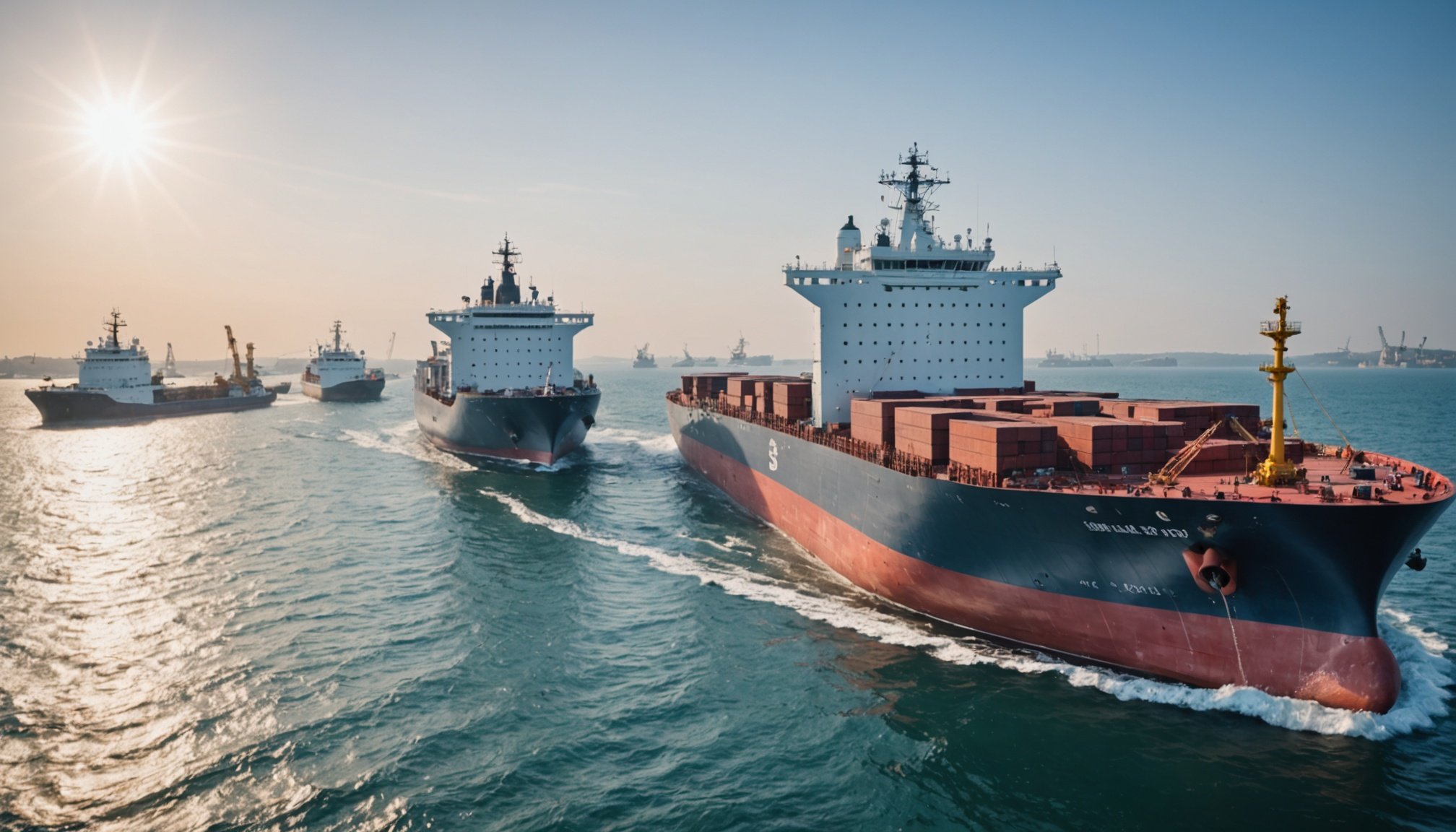Overview of Maritime Compliance
Maritime compliance is indispensable for shipbuilding firms to ensure smooth and uninterrupted operations. With increasing global scrutiny, adhering to international maritime law and specific shipbuilding regulations safeguards businesses from legal entanglements and enhances their reputation.
The importance of compliance stems from the necessity to meet both UK and international maritime regulations. The United Kingdom, being a major hub for maritime activities, enforces stringent standards that shipbuilders must follow. This includes the Maritime and Coastguard Agency regulations that aim to prevent accidents, pollution, and ensure the well-being of the crew. A robust understanding of these laws is vital for firms to thrive.
Also to read : Establishing a successful organic food marketplace in the uk: your essential guide to navigating local health regulations
Globally, the International Maritime Organization (IMO) establishes essential guidelines that serve as the backbone for international maritime law. Ignoring these can severely impact business operations, causing delays and financial penalties.
The consequences of non-compliance can be dire for businesses. Not only do firms face legal action, but they also suffer reputational damage that could affect future contracts and partnerships. Therefore, proactive efforts in understanding and aligning with both local and international regulations are crucial for the sustainability and growth of any shipbuilding enterprise. By prioritizing compliance, firms ensure their place in a competitive and regulated global market.
This might interest you : Your essential handbook to uk waste management compliance: a navigational guide for recycling startups
Key Regulatory Frameworks
Regulatory frameworks serve as the backbone of maritime governance and shipbuilding compliance. These structured systems ensure shipping companies adhere to set standards and protocols, safeguarding both the environment and global trade operations.
UK Maritime Regulations
The United Kingdom enacts a comprehensive range of maritime regulations, pivotal for overseeing its vast shipping industry. Core regulations include the Merchant Shipping Act and guidelines from the Maritime and Coastguard Agency (MCA), focusing on safety, pollution prevention, and crew welfare. The MCA, alongside the Department for Transport, plays a crucial role in enforcing these standards, ensuring compliance through regular checks and audits. Recent updates emphasize stricter environmental controls, aligning with worldwide sustainability goals.
International Maritime Regulations
Globally, the International Maritime Organization (IMO) sets precedent with its extensive guidelines aimed at standardizing shipping practices. These frameworks often intersect with UK regulations, creating comprehensive coverage across jurisdictions. International treaties and conventions, such as MARPOL, harmonize shipping standards, facilitating safer and cleaner sea operations. While key differences between UK and international norms exist, their alignment across major concerns—safety, pollution, and labour rights—demonstrates a shared dedication to knowledgeable and responsible maritime commerce.
Best Practices for Compliance
For companies aiming to thrive in the shipbuilding industry, establishing compliance best practices is essential. Developing a comprehensive compliance management system is the cornerstone of effective regulatory adherence. This system should be robust, incorporating mechanisms for monitoring, updating, and adhering to the latest shipbuilding industry standards.
Training and education of staff play a pivotal role in ensuring that all team members understand and can execute compliance standards effectively. By offering regular training sessions, firms can keep personnel informed about new regulations and refresh their knowledge of existing ones. This approach not only aids in maintaining high compliance levels but also empowers employees to take ownership of their roles in regulatory adherence.
Continuous monitoring and updating of compliance procedures are fundamental. A proactive stance helps firms stay ahead of regulatory changes and prevents potential pitfalls. Regular audits and assessments can ensure systems remain effective and responsive to evolving compliance best practices.
In summary, a well-structured compliance management system, combined with ongoing staff education and vigilant monitoring, positions shipbuilding firms to succeed in a highly regulated environment. Focusing on these practices ensures compliance is an integrated, seamless component of daily operations.
Case Studies and Real-World Applications
Exploring real-world shipbuilding case studies provides invaluable insights into compliance success stories and practical applications. Understanding these cases allows industry players to learn from proven strategies and avoid common pitfalls.
Case Study 1: Successful Compliance in UK Shipbuilding
This study revolves around a leading UK shipbuilder known for overcoming huge compliance challenges. The firm adopted a two-pronged approach by integrating advanced regulatory management systems and prioritising staff training. This combination ensured that their operations aligned with both UK and international shipbuilding regulations.
- The firm established a dedicated compliance team.
- Regular audits and a culture of accountability were fostered.
- Emphasis was placed on continuous staff education.
Such deliberate measures resulted in flawless compliance adherence, reduced regulatory penalties, and improved operational efficiency. Lessons from this case stress the importance of robust compliance frameworks accompanied by regular training.
Case Study 2: International Compliance in Shipbuilding
A global shipbuilder successfully navigated the complexities of international maritime law. By embracing technology-driven compliance innovation, the company achieved seamless integration across jurisdictions. Their strategic approach included real-time monitoring and adherence tools that allowed alignment with diverse international standards.
- Utilising digital management systems.
- Proactive engagement with international regulatory bodies.
These strategies led to impressive outcomes, showcasing the importance of technology and foresight in modern compliance management.
Tools and Resources for Compliance Management
Efficiently managing maritime compliance requires a suite of reliable tools and resources tailored for the shipbuilding industry. These compliance tools are essential in streamlining regulatory processes and ensuring adherence to both domestic and international shipbuilding regulations.
Various software solutions offer comprehensive regulatory management systems that automate compliance tracking, update users on changes in maritime laws, and provide valuable analytics. Platforms like ShipManager and ABS Nautical Systems are notable examples, offering functionalities such as document control, crew management, and real-time monitoring of compliance data.
In addition to digital platforms, tapping into extensive shipbuilding resources like industry whitepapers, webinars, and forums can substantially boost knowledge and preparedness. Renowned bodies and associations often provide up-to-date guidelines and courses as part of ongoing educational support.
Keeping abreast of the latest technological advances, including blockchain and artificial intelligence, is crucial for regulatory management systems. These technologies enhance transparency and predictive analysis, empowering companies to anticipate regulatory changes swiftly.
To maximize compliance efficacy, firms are encouraged to explore integrated solutions that combine various compliance tools into one cohesive system. By leveraging the right resources, shipbuilders can stay ahead of regulatory demands and ensure robust adherence to the evolving landscape of maritime compliance.
Future Trends in Maritime Compliance
The evolving landscape of maritime compliance presents both challenges and opportunities for the shipbuilding industry. Looking ahead, several trends are set to transform how compliance is managed.
Anticipated changes in future maritime regulations focus heavily on sustainability. With rising concerns over environmental impact, regulations are increasingly steering towards stricter emissions controls and energy efficiency measures. These changes aim to reduce carbon footprints and encourage greener practices in shipbuilding.
Compliance innovation is being driven by advanced technologies, notably in data analytics and automation. The integration of blockchain technology promises to bolster transparency in regulatory management systems, while artificial intelligence enhances predictive analysis, enabling proactive regulatory adherence.
Looking towards the future, shipbuilding firms must prepare for heightened complexities in global compliance frameworks. Adapting to these trends requires companies to align themselves with technological advancements and anticipate regulatory shifts. This proactive stance will be critical in mitigating risks and seizing new opportunities.
The journey forward demands strategic investment in both technology and expertise, paving the way for more resilient compliance mechanisms. Shipbuilders who embrace these innovations will secure a competitive advantage in the ever-dynamic maritime compliance landscape.











